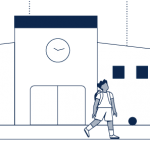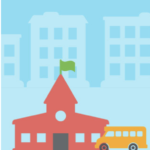The theme of this year’s CoSN conference was Designing Learning in the 4th Industrial Revolution. (CoSN is the Consortium for School Networking, a professional association for K-12 school system technology leaders.) In the weeks since the event, I’ve thought a lot about the potential of this new industrial revolution—the connecting of the physical, digital, and biological worlds—and the way it will herald broader and deeper adoption of next-generation digital teaching and learning environments. My thoughts have coalesced into my top three takeaways from CoSN 2018.
1. Schools and educators, and the education partners like Cisco who support them, need to work together to ensure we’re ready for unprecedented and rapid change. For example, every day, in schools around the country, we are already witnessing the intersection of our physical and digital worlds; it is truly the 4th Industrial Revolution in action. In some classrooms, experts from across town or across the globe engage with students in real time about exciting topics, while on other parts of school campuses, artificial intelligence and analytics help personalize instruction so that students have what they need to learn in new, innovative ways. In all cases, a digital education platform supports this digital learning and the digital campus.
Education platforms extend beyond the learning environment as well, and the same intelligence that empowers teaching and learning can automate both physical and cyber security monitoring and enable network and systems management to lift some of the burden from IT staff. Valuable resources stand at the ready to help us through change.
2. We must be vigilant when it comes to protecting what matters. In events of all types, from natural disasters, to predators on campus, to cybercrimes, schools—and their students and educators—are often on the front lines. At the CoSN conference, Sheryl Abshire, the chief technology officer of Calcasieu Parish Public Schools in Louisiana (and CIO during Hurricane Katrina), said, “Don’t think a disaster will never happen to you. It is not a matter of if, it is a matter of when.” (Read more in this article from EdSurge.)
A 2017 article in THE Journal anticipated an increase of as much as 100 percent in the number of cyber incidents in K-12 schools, yet it is not uncommon to hear someone say, “Who cares what a sixth grader has on his laptop?” The truth is that for a cybercriminal, that sixth grader and his laptop, if unsecured, can provide a gateway to faculty and student data on his school’s network, as well as to his parent’s personal information. That same student (or one of his peers) may use a laptop on the school network to hack into school systems, manipulate grades or wreak havoc with systems. Even educators and administrators aren’t immune; an innocent click on a phishing email can cause a massive data breach.
3. The 4th Industrial Revolution is opening the door to change of a size and scope unlike anything we’ve seen before. Any change, but especially a change this massive, is exciting, invigorating, challenging, and terrifying all at once. Navigating the process is easier with help from those who have done it before. At the CoSN conference, leaders talked about the value of embracing organizational change management to help drive change in schools. (I wrote about 5 change management tips for schools in an earlier post. You can also read a white paper on the subject.) Organizational change management techniques can help schools strategize, plan, and execute to create next-generation digital learning environments.
Bonus: one of the highlights of CoSN for me was hearing Neil Pasricha speak live. It was easy to understand why the author of The Book of Awesome and The Happiness Equation is one of the most popular TED speakers in the world. You should absolutely see him if you have a chance.
Keep in mind that there are resources available to help us thrive in the 4th Industrial Revolution, including this white paper, which was written in partnership with education and technology leaders from across the U.S.


It is never to early to begin a digital education. If we start with simple steps such as strong passwords then migrate into other things such as visiting secure web sites and how to determine that, we will make a more secure generation of technology natives.